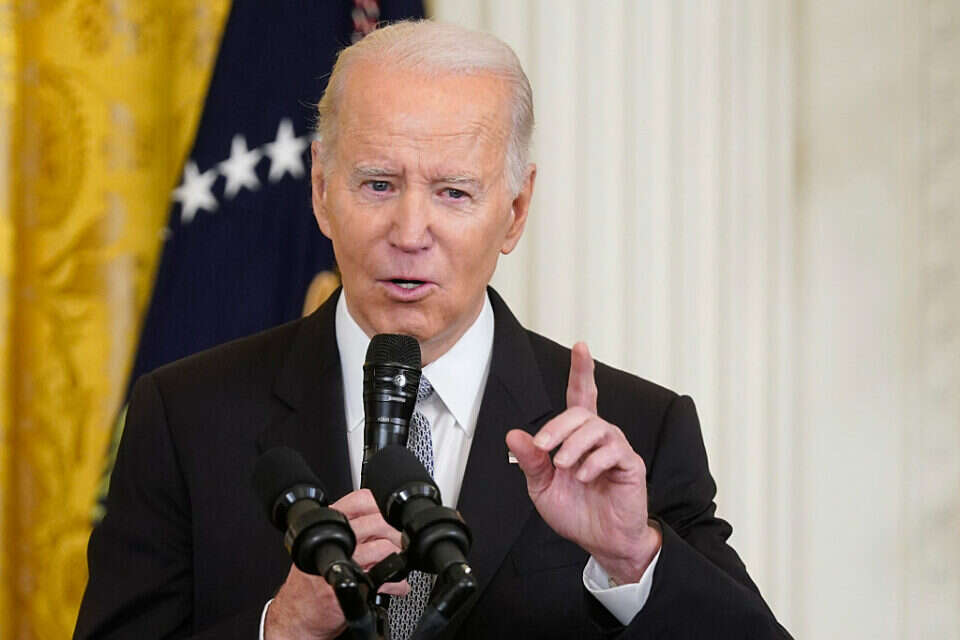
Reform Does Not Interest Biden
Proportion. There have been quite a few disputes between the Israeli and American government over the years and, yes, these disputes have unfolded before both Republican and Democratic presidents.
As early as 1977, President Jimmy Carter said the Palestinian issue was the heart of the conflict. He maintained that there had to be a withdrawal to the 1967 borders and spoke about cooperation with the PLO given the rise of Menahem Begin to power, saying, “Difficulties have resulted from a change in ruling leadership. Over the long term Begin will have to moderate his positions.”* At the beginning of the 1990s, one particularly recalls George H.W. Bush rejecting loan guarantees to Israel as long as Yitzhak Shamir refused to ensure that the money would not finance settlements. Bush’s involvement created a major crisis that many say led to Shamir’s downfall. Similarly, Bill Clinton told of how he became involved in Israel’s 1996 elections on behalf of Shimon Peres to prevent Benjamin Netanyahu from rising to power.
Further, there was constant U.S. pressure on Israel under the administration of Barack Obama. The first invitation extended to Netanyahu to visit the White House in May 2009 included an unprecedented political demand that Israel immediately freeze construction of settlements, including construction for “natural growth." A month later, when Obama embarked on a tour of the Middle East, he skipped Israel and spoke in Egypt. During a scheduled to visit Israel four years later, Obama declined to address the Knesset and spoke “directly to the people” with a group of students.
At the end of his term, following a major dispute between Israel and the U.S. over the nuclear agreement with Iran, Obama for the first time breached U.S. support for Israel at the U.N. and did not veto Security Council Resolution 2334 ruling that the settlements were illegal.
We understand these are not welcome moments in diplomatic and policy terms, but the short view shows us in simple terms that independent foreign policy by the State of Israel can lead to disputes and even crises with the U.S. administration.
The overview also demonstrates that whether you are discussing the Palestinian issue or the Iranian nuclear struggle, the context of the disputes is the Israeli administration’s foreign policy, not its domestic policy.
When hasn’t there been disagreement? When Yitzhak Rabin made the Oslo concessions according to the White House's expectations, he was called a friend. Further, Ehud Barak’s sweeping agreement with Clinton’s political outline in 2000, including a return to the 1967 borders, dividing Jerusalem and vacating the Jordan Valley, won him the admiration of the American administration.
In an interview last weekend, former Israeli New York Consul General Assaf Zamir highlighted his commentary on relations today between the U.S. and Israel. “Israel is a protectorate of the United States.” We don’t know whether this was an inadvertent slip of the tongue or whether Zamir was truly reflecting the foreign policy that gave rise to the government of Yair Lapid and Naftali Bennett who appointed him.
Either way, it appears that the current crisis springs from this policy reversal. In short, a custodial state is “out” and an ally and sovereign state is “in.”
We should still note the general withdrawal by the U.S. from the Middle East, which has continued for more than a decade. The democratization campaign and George W. Bush’s “axis of evil” was replaced by Obama’s movement in the region “without soldiers on the ground,” and Donald Trump and Joe Biden’s ensuing withdrawal from Iraq and Afghanistan.
This process, alongside a changing policy, particularly regarding the Iranian threat, also requires Israel to reconsider its steps, and it appears that the Netanyahu government is weaving a new international fabric for the struggle.
The heroic attempts, if you can call them that, to link the current dispute with the American administration to judicial reform, or to any other domestic Israeli issue, are, in the end, a cover for dissatisfaction with an Israeli foreign policy that is not conciliatory. When the Bennett-Lapid government compromised on ceding territorial waters to Hezbollah without any parliamentary discussion and without a referendum as required by law, the Biden administration, who sponsored the move, was not interested in the issue of Israeli democracy, only foreign policy.
*Editor’s note: Although accurately translated, the original quoted remark could not be independently verified.


